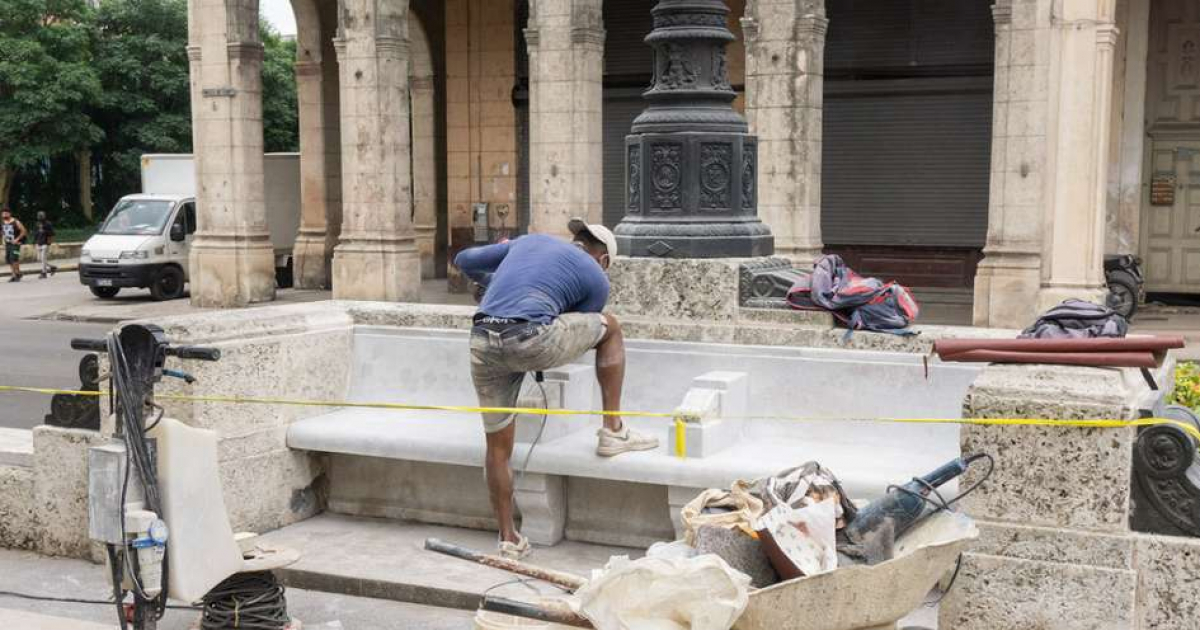
The Cuban government commissioned the restoration of the Paseo del Prado to private sector workers who were hired by the Office of the City Historian.
An information from the US agency AP revealed that the works would have begun several months ago with state workers, but now it is in the hands of small businesses and private artists, something unprecedented in a public project of this magnitude.
"They are very professional," acknowledged Mariela Mulet, head of the institution's Prado Investment Unit.
Mulet confirmed that the Office of the Historian is a pioneer in independent work force in Cuba, and that he decided to call entrepreneurs with experience in large-scale restorations, such as that of the Capitol.
"In the case of the Paseo del Prado, everyone is private," he said.
With an initial budget until July of about 14 million pesos (almost 600,000 dollars), the restoration includes the granite floor, the stone walls, the marble benches and the iron lampposts. It is also expected to replace the entire electrical system of public lighting and replace plants that have become ill, thanks to a study with the Botanical Garden.
Workers interviewed agreed that it is positive to work with the State as long as they continue to belong to the private sector. They argued that being independent allows them to make decisions without depending on the enormous state bureaucracy.
"In my experience, I worked in state-owned companies, and it is better as an individual because sometimes we look for many solutions ourselves," said a 40-year-old restaurateur.
To install the lighting, the Office of the Historian hired Watt Electric, a group of self-employed workers who carried out the electricity installations in the Capitol of Havana, and who are now in the process of forming an SME, following the latest regulations for work by own account approved by the government.
In September 2021, Decree-Law 46 came into force, which allows the creation of micro, small and medium-sized businesses (MSMEs), in order to "facilitate" their insertion into the "productive transformation of the country."
Until last week, the country totaled 1,787 MSMEs, the vast majority private, 25 and non-agricultural cooperatives (CNA).
The creation of these economic forms responds to the application of the so-called "improvement of the economic model", and has the creation of jobs as a secondary objective. According to projections from the Ministry of Economy and Planning, MSMEs could create more than 27,000 jobs.
This week work began for the construction of the Manzana Payret tourist complex and the Pasaje hotel in Havana, in front of the Central Park, an area where a good part of the regime's latest investments are concentrated through the business-military conglomerate that controls tourism in Cuba.
"Construction of the Manzana Payret tourist complex and the Pasaje hotel have begun, which will rise on the ruins of the Kid Chocolate sports hall and the Payret Cinema, respectively," the news site indicated. Cuba News 360.
Although the authorities assured that the historic cinema will be respected and maintain its function as an exhibition hall, at the time the works began it is unknown if this official commitment will be respected.
Several activists expressed concern about the opacity of the project, of which no details are known so far. In the absence of official clarification, Cubans are concerned about the conservation of their assets and project data such as investors, the cost of the works and others.
What do you think?
COMMENTFiled in: